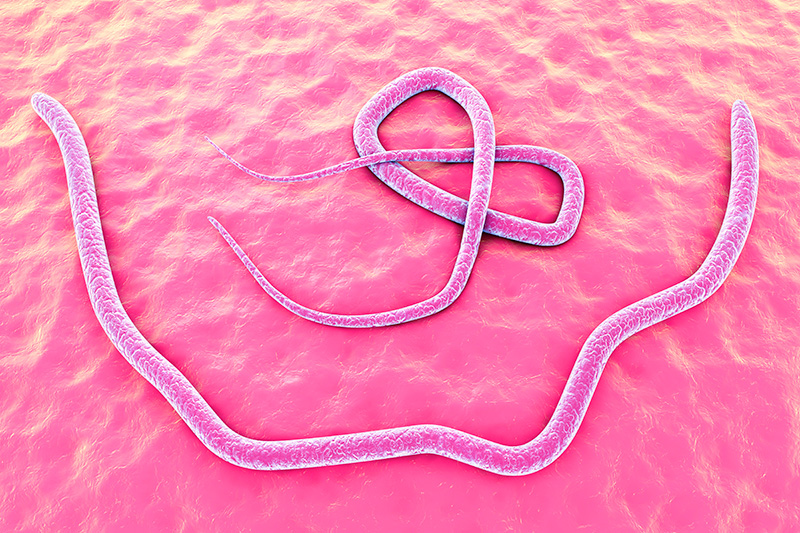Where the worms come from and what to do
Even outwardly healthy-looking animals can have worms, which can cause suffering, illness and sometimes even death if the infestation is great enough to block their intestines or cause severe anaemia. Depending on the type of worms they have, some of the diseases they carry can also be transmitted to humans, so it’s important to worm regularly even if you’ve seen no evidence of infestation.
What kind of worms can infect my cat or dog, and how do they catch them?
Roundworms and tapeworms are the most common threats, but pets can also suffer from hookworms and whipworms, which are more common in dogs than cats.

Tapeworms
There are a few different types of tapeworms, and these live inside cats and dogs by using their hook-like mouths to attach to the small intestine. As these worms grow and mature, segments break off and are passed out in faeces. As these segments dry out, they break open and fertilised eggs are released. But pets aren’t infected or re-infected by these eggs – they have to pass into an intermediary host first, then the cat or dog ingests this and gets infected that way.
- The most common tapeworm is Diphylidium, and this uses fleas as the intermediate host. This means that the tapeworm will only be passed by eating an infected flea, and this usually happens during grooming or when your pet licks themselves in response to a flea bite. These can’t be passed to humans (unless you also eat an infected flea!) just cause problems for your pet.
- Taenia tapeworms are dangerous for hunters as they can be caught by eating prey or waste containing the infective larval stage. These worms’ intermediate hosts include rats, mice, rabbits and sheep. These can’t be passed to humans either, so if your cat is a hunter – don’t worry. Just continue to protect them through regular worming.
-
With the increased popularity of raw-fed diets, another tapeworm that has become a concern is the Echinococcus species. These (primarily dog-only) tapeworms are very small, have only three or four segments, and are usually less than 1 cm in length but can cause disease in humans. Intermediate hosts can be sheep, pigs, cows and horses, so they can be found in raw meat. Occasionally humans can pick them up by eating contaminated food or by ingesting eggs through hand-to-mouth contact with infected faeces. Humans may not show clinical signs until years after ingestion, and the disease results in cysts being formed in the liver.
Fortunately, deworming your raw-fed dog every six weeks and having regular worm counts can keep this potential risk under control and allow you to use the diet of your choice safely. It is, however still important to wash your hands after preparing their food, playing with your pet, or being in areas where they or other animals may have defecated.
Hythe Healthcare Plan membership includes a parasite control program.
We’ve specifically developed the Hythe Healthcare Plan to make it simple for you to look after your pet. Get access to annual worming treatments and much more, all design to ensure your pet stays healthy.
Lungworm
Lungworm is also becoming a greater problem – although happily it only infects a small percentage of animals at the moment – and this is only transferred to your pet through eating a slug or snail. Lungworm tends to be a localised problem, so it’s worth talking to us to find out if this is currently a problem locally.
Roundworms
Roundworms feed off partially digested intestinal contents. Female roundworms are prolific breeders and can produce 200,000 eggs in just one day! The eggs are protected by a hard shell, and this means they can survive in soil for years. Roundworm eggs can hatch in the human intestine, and then the immature worms can travel to various tissues in the body, including the eyes and brain. Serious infections can damage these organs and cause blindness, so another one that is best treated for regularly.
I haven’t been regularly treating my pet for worms and now I’m worried they are infected. What are the signs?!
If you’ve been unable to treat your pet for any reason, here are the signs to look out for that might suggest there’s a worm problem:
- You may see worms in faeces, vomit, or around your pet’s bottom. These are actually segments of a much bigger worm inside and can be between a few millimetres to 3cm long.
- Your pet might have lost weight recently.
- Their fur might have changed and become dry and coarse.
- They might have an increased appetite and have diarrhoea.
- They may appear weak.
- In severe cases, infected puppies and kittens can have a distended abdomen (also sometimes known as a pot belly).
How can I stop my pet getting worms?
Your pet is exposed to worms in several ways, and it’s almost impossible to prevent exposure. That’s why we recommend treatment to ensure it never establishes itself as a problem.
A thorough and continuous worming programme from an early age is the best way to ensure your pet and your family are safe from worms. It is also a good idea to make sure your pet’s water, food bowls and bedding are regularly cleaned and disinfected, using a disinfectant suitable for use around animals.
We offer broad-spectrum wormers that we will prescribe to match your pet and their lifestyle, so don’t worry about having to make sure you’re covered against all these variants of pests! Just come and see us, and we’ll ensure you’re fully protected.
My dog/cat is pregnant. Should I continue to worm them?
Pregnant cats and dogs who have worms pass them on to their puppies and kittens whilst they are still in the womb as the microscopic larvae migrate through the mother’s tissues into the womb.
Roundworm larvae can also be given to the puppy or kitten from the mother’s milk. They then travel to the intestine, where they can grow up to five inches long, so worms can be a really serious issue for a tiny animal.
Most wormers are only effective on adult worms existing in the intestinal tract and wouldn’t kill off larvae lurking in other tissues ready to migrate to the womb during pregnancy. If you plan on breeding your animal, it’s essential to ensure they are continuously wormed before pregnancy occurs.
Always speak to us before administering any drugs such as wormers to pregnant animals so we can recommend a suitable product to use during this time.

Hythe Healthcare Plan membership includes a parasite control program.
The most effective way to make sure you offer unbroken protection to your pet and your family is by regular worming. If you are a member of our Hythe Healthcare Plan tyou will be covered all year round and pay less for your wormers too! If you aren’t already a member, click here to find out more.
